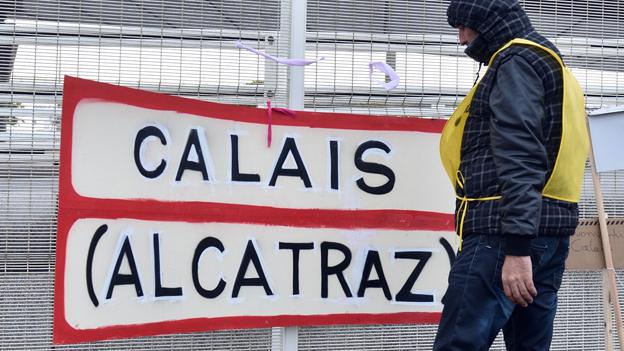'I’m a trucker not an immigration officer'
- Published
Tommy Wallace and Robert Weir say Calais is dangerous for lorry drivers
Lorry drivers have long been attracted to the job by the freedom of the road. But some say that in Calais, northern France, they are now taking on the role of amateur immigration officer. I spent three days with those travelling through the port town.
"I opened the door with another driver and I had six adults and a baby in the trailer," Euan Fleming tells me.
At a diesel stop in Calais - home to makeshift camps of thousands of migrants hoping to cross the border into the UK - he checks the padlock on the back of his huge lorry. It's intact this time, but he tells me about a recent occasion when it wasn't.
"I'm a dad, I've got two kids - a five-year-old and a three-year-old - and this mum [in the trailer] had nothing with her. No bags, no packages, no nothing."
He and his colleague told them all to get out. Euan didn't ask where they came from, but says he's often wondered if they ever made it to the UK.
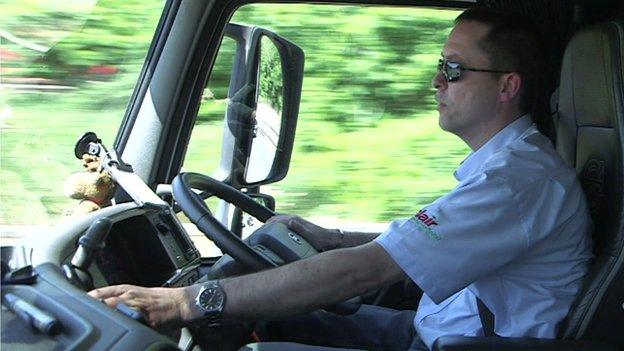
Euan Fleming believes driving a truck through Calais has become increasingly dangerous
"I was shocked, but the bottom line was I had seven immigrants in the back of the trailer - I was sympathetic but not to the extent that I was willing to pay £14,000 to bring them into the UK."
That is the issue for the lorry drivers I meet - fines. Their company faces having to pay £2,000 for each asylum seeker or migrant they bring across the Channel.
They say they are fed up. Many, like Euan, say they have run out of sympathy, though others are far more harsh.
"They should all be put in a boat in the middle of the ocean and sunk," says one lorry driver from Ireland who won't speak to me on camera.

Watch Victoria Derbyshire weekdays from 09:15-11:00 BST on BBC Two and BBC News Channel, for original stories, in-depth interviews and the issues at the heart of public debate.
Follow the programme on Facebook, external and Twitter, external, and find all our content online.

Most lorry drivers are not that extreme, but say they are finding the situation increasingly intimidating. Euan is 43 and has been trucking since he was 20. He's from County Down and tells me the job was initially the perfect escape from the nine-to-five job he'd found unbearable.
It used to be a great job, he says. The freedom of the road, no office, no desk, plenty of laughs with the other guys and all sorts of adventures in random locations across Europe.
Now, he says, it's different. Euan's boss Alan Blair sent pictures into the BBC to illustrate what his lorry drivers were seeing daily in Calais. There's a genuine sense of sadness from the men [there are still very few women doing the job].
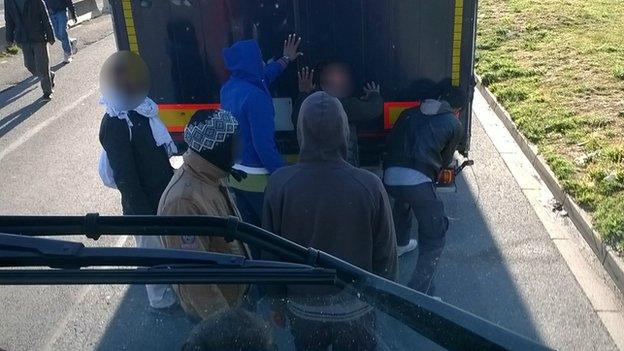
Mr Fleming has taken images of migrants entering UK-bound trucks in front of his own vehicle
"Most of these guys [those trying to get to the UK] are armed with Stanley knives because they usually cut their way into the trailers," says Euan.
"We are supposed to get these guys out ourselves. I'm qualified as a truck driver - that's what I'm trained as. I'm not qualified as crowd control or riot police."
Underneath his vehicle, Euan points out another place he's previously found a migrant hiding - wrapped around the middle wheel axle.
It's shocking to see - an impossibly cramped and perilous place to travel.
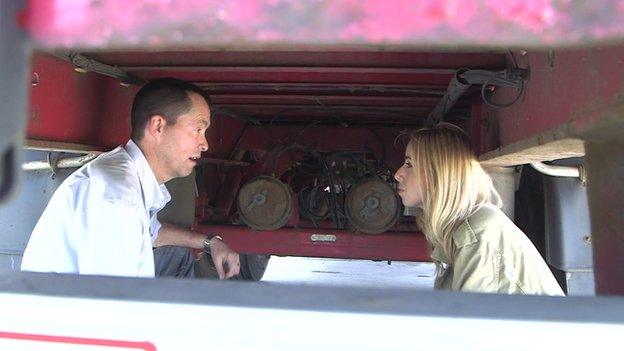
Euan says he has previously found a migrant wrapped around this truck's middle wheel axle
A man had wound himself in and out of the brake parts - the heavy load inside squashing down on him while the lorry bounded down the motorway at 50mph (80 kmh).
I put it to Euan that this must make him sympathise - hiding here is a death wish, and one that illustrates the level of desperation to get to the UK.
"On a wet day especially you'd be close to drowning under here," he says, "it's totally insane. They must be desperate, yes."
There is a huge sense of them and us here, the truckers versus the asylum-seekers and migrants. The two groups don't communicate and Euan is even worried for my safety when I get out to speak to people living in Calais's vast makeshift camps.
Almost everyone I meet is from Sudan or Eritrea - fleeing war, and seeing the UK as more sympathetic to their suffering than France.
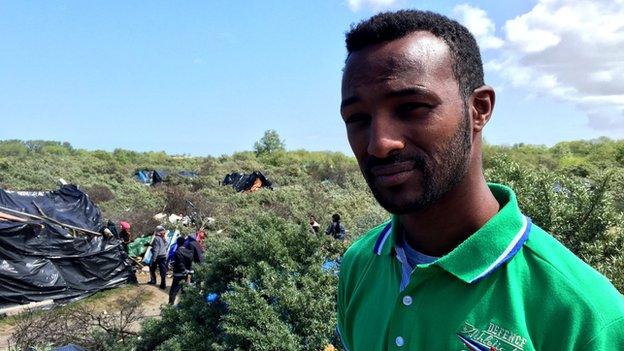
Haroon Tsegaye is one of thousands of Eritreans in Calais hoping to make it to the UK
Haroon Tsegaye from Eritrea says he just wants "a home, work, safety and respect."
Another man, Talal, from Sudan, says they know the truckers don't like them. He understands they face fines, "but what choice do we have?" he says.
One of the men in Euan's photos - also from Eritrea - is still in Calais. He says he will keep trying to make it to the UK.
"We are fleeing dictatorships in Africa," he explains, "we are not economic migrants. Even sleeping here in a tent is better than in Eritrea in constant danger."

UK asylum statistics
Migrants in Calais made around 100 attempts a day to get into the UK illegally during mid-2014, latest Home Office figures show.
The UK received 31,407 applications for asylum, including those of dependants, in the year ending March 2015.
The largest number of applications came from nationals of Eritrea (3,552), Pakistan (2,421) and Syria (2,222).
Of initial decisions taken on whether to provide asylum or an alternative form of protection to applicants, 40% (10,346) were successful.
The UK had the fifth highest number of asylum applications within the EU in 2014/15, behind Italy (56,300), France (63,100), Sweden (81,300) and Germany (166,800).
Source: Office for National Statistics (ONS)

Euan meets up with two fellow lorry drivers - Tommy Wallace and Robert Weir, also from Northern Ireland.
Both have been on the road for more than 20 years, and recognise that those trying to get to the UK are fleeing war zones - but also say they are completely out of sympathy.
I ask Robert if he would do anything to get his family to safety. "Of course," he says, "but this is at other people's expense.
"At the end of the day, it's the taxpayers keeping them in this country and there are enough poor people already between here and Northern Ireland."
Robert found four Syrians in the back of his truck three months ago - he was already in Birmingham when he heard them banging to get out. He called the police, who arrived with an ambulance and a doctor's car.
"All that for immigrants", he says, annoyed at the use of UK resources.
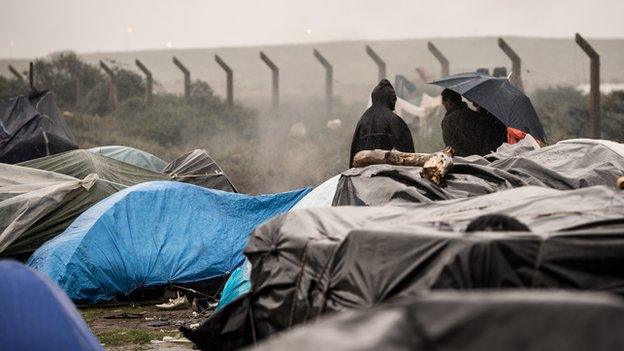
Calais is home to thousands of migrants living in makeshift camps
A statement from the UK's immigration minister James Brokenshire says the government "continues to work with the industry to strengthen the security of our borders to stop those who have no right to enter the UK".
He adds that it held a "summit with key representatives from the haulage and food transport industries in March to discuss measures to deal with the impact of migrants who illegally stow themselves on board vehicles to enter the UK".
But Euan tells me he doesn't feel like those in charge of UK immigration really have a clue what is happening on the ground.
"I would challenge the immigration minister to come and sit in my truck where you have sat and witness what we have witnessed. I would love to hear his solution.
"We have to be lucky every time to keep the immigrants off. They only have to be lucky once to make it to the UK."
Watch Catrin Nye's full film on the Victoria Derbyshire website.
- Published31 March 2015
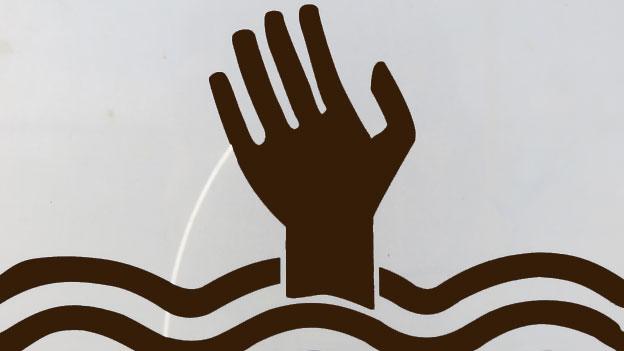
- Published31 January 2015
